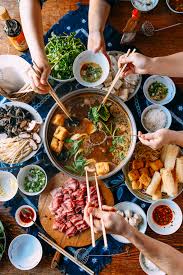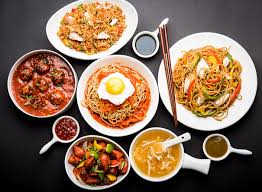Hot Pot
Sichuan hot pot originated in Chongqing

The hotpot was created during the Shang (16th century-11th century BC) and Zhou (11th century-256 BC) dynasties. Chongqing hotpot appeared later, approximately in the Qing dynasty (1644-1911).
Sichuan writer Li Jieren claims Sichuan hot pot originated in Chongqing. “Dealers in Chongqing usually bought buffalo visceral, washed them and cooked for a while,” Li said. “Then they cut the liver and stomach into small pieces. They set a mud stove with a grid iron pot on it, where spicy, numb and salty soup bases were boiled. Workers came and chose a cell in the pot, cooked themselves and ate from separate blocks. Price was based on how much they ate. This was economic and satisfying.” In the Republic of China era, a small restaurant in Chongqing brought hotpot to the table. A mud stove was kept while a soup base and dipping sauce could be selected by diners themselves. The Chongqing hotpot contains red spices, red-hot soup, dense peppers, and a hint of spices at the bottom of the pot. Just this glimpse of the boiling water arouses the spread of saliva.

Photo by: thewoksoflife
The creation of Chongqing steamboat style is related to the terrain and climate in Sichuan. As a basin area, Sichuan has heavy and lingering precipitation in the winter, so the spice is used to drive away excess moisture from the body. The combination of spices and peppers is perfect, although for some the pepper makes the tongue numb so it is difficult to adapt to.
The soup base is the key to success in Chongqing hotpot. If the hotpot is Yuanyang type, which is mainly divided into two kinds — red soup and clear soup — diners are advised to enjoy the pure flavors of the soup before adding anything to it. Soup bases that has been boiling for a long time can harm one’s health due to buildup of Nitrites. Many people enjoy eating hot pot with cold drinks. For those with elevated blood pressure, if a cold drink is consumed right after eating hot soup, a person’s blood can fluctuate rapidly, raising the risks of myocardial infarction. Cold drinks should be consumed at least three minutes after having the hot soup. Diners should note the temperature of Chongqing hotpot, which can usually exceed the tolerable limits of the mouth, esophagus and the gastric mucosa (50 to 60 degrees centigrade) at 120 degrees centigrade. Be sure to wait for the food to cool down before eating.
Sources:
Chinadaily




